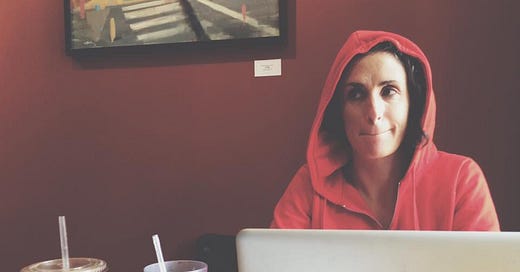Writing About Other People
Like your mom, for example. How I chose to write about my parents, ex-husband, and more in my first book, and what happened. Part of my "Behind The Scenes of Book Writing" series.
The Sober Life begins next Monday, February 5! Learn more and register »
Also, I lead a sobriety support meeting every Tuesday at 8 am ET over at The Luckiest Club. Learn more and join me »
In a conversation with my agent a few months ago, I said, “I’m realizing people are going to hate me when this book comes out.” This wasn’t the main point of the call, but it had been on my mind. I’d started mapping out the themes for the book—a memoir about romantic relationships, or what I call my “second sobriety”—which, from a certain angle, started to look like a very long list of men’s names, several of whom overlapped with my marriage.
My agent didn’t try to convince me otherwise because some people are always going to hate your story (especially if you’re a woman—or, god forbid, a mother—who dares to admit she’s a whole human). She did ask some questions, though, trying to get at what I was really worried about.
Turns out it wasn't the general public, but the people I know—people who will be part of the story: my parents, ex-husband, men I “dated” and people connected to them, my ex-husband’s family, who I’m still close to—who may read it. Because of the nature of this book (relationships), it feels so much more intimate than We Are The Luckiest (WATL) did. In WATL, I was writing largely about the interiority of my experience with addiction. It was certainly intimate, but addiction isn’t a person. Writing this next book requires me to include other people more directly and specifically, as well as to talk about the most intimate aspects of being human (sex!) and go deeper into my formative relationships (parents!).
This call happened before I’d written anything, and my agent kindly reminded me that there are many, many steps between writing and publication. And that reminded me of how I approached WATL when I got hung up on the other-people-ness of it: I had to write it as if no one would ever read it. This approach saved me because it allowed me to write the damn thing in the first place, but it also made the story so much more honest and alive. There are literally hundreds of steps and checkpoints between the first draft and publication. I had to put the raw, overexposed, sometimes revenge-y, often judgmental version of the story down first in order to find the real aboutness of it.1
In this piece, I’m not going to talk about the book I’m working on now but rather share my process for WATL, including how I approached writing about the main characters (my mom, dad, brother, ex-husband, and ex-boyfriend Jon), how I prepared them for the book coming out, and what happened when they read it.
It’s always fascinating and sometimes helpful to hear these stories from other authors. I know results vary widely from author to author and book to book, so if you’ve got a story to share about how writing about other people went for you, please share in the comments. INQUIRING MINDS WANT TO KNOW.
The main people in We Are The Luckiest and how I approached writing about them.
A few notes: Both of my parents are still alive (they divorced when I was six). When WATL was published in 2020, my ex-husband and I had been divorced for eight years.
My dad isn’t a main character in WATL, even though he’s a big part of my history. I realized early on that I wasn’t going to include a lot about him or our relationship—just a few lines. This was just instinct at the time. In hindsight, I wasn’t ready or willing; when I did try to bring him in, it felt too complicated and overwhelming. I made the right choice for the story and for me.
Keep reading with a 7-day free trial
Subscribe to Love Story to keep reading this post and get 7 days of free access to the full post archives.



